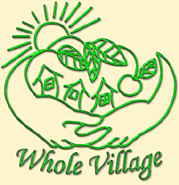The Permaculture Design Course at the Whole Village will take place on July 22 to August 4, 2012, in Caledon, Ontario. This course is designed to create a self sufficient lifestyle in harmony with nature. This intensive 13 day course offers practical training in permaculture design principles and techniques to create sustainable environments that provide self-reliance in food, shelter, energy, fulfilling employment and supportive community. This training will be useful for those from beginning, backyard gardeners to design professionals. Field trips and practical sessions for design and gardening are included. Evening seminars and socials complete the day sessions. Topics include: Ecological Landscape Design, Organic Gardening, Edible Landscaping and Forest Gardening, Poultry Care, Appropriate Technology, Ecovillage Design, Ecoforestry, Soil Fertility and Composting, Fruit and Nut Production, Water Harvesting and Uses.
The instructor is Gregoire Lamoureux, he is a permaculture designer, writer, consultant and teacher. He is the director of the Kootenay Permaculture Institute. He has taught and worked with urban, rural and commercial permaculture systems in Canada for 20 years. Skilled guest speakers will be presenting as well, e.g. Richard Griffith, Jane Hayes.
Participants will be able to observe and take part in hands-on activities on the farm as well as experience a functioning ecovillage (green intentional community). Permaculture or “permanent agriculture” was originally conceived over 30 years ago by Australian ecologist Bill Mollison. Observing aboriginal culture and forest ecosystems, he concluded that we could deliberately design agriculturally productive ecosystems, echoing the diversity, stability and resilience of natural ecosystems.
Permaculture designs provide food, energy, and shelter for people and animal inhabitants while linking the needs and outputs of each element. The result is a dynamic yet stable system that sustains itself. Permaculture is a holistic approach to land use, which works with nature’s rhythm and patterns, weaving together the elements of microclimate, annual and perennial plants, animals, water and soil management, and human needs into intricately connected and productive communities. Permaculture systems can be developed in any climate and on any scale. Designs have been developed for balconies, backyards and for entire villages and urban communities.
Testimonials
“It has been a joy and a privilege to be a part of this incredible, transformative experience.”
“You have fed my mind, my soul, and especially my body.”
“You have significantly changed so many lives.” “I will carry this experience in my heart - moving forward in my work, community life, and inner journey.”
Click here for more information or contat Brenda at bdolling (at) wholevillage.org or call 519-942-4010.
© 2011, Richard Matthews. All rights reserved.
Related Posts
Food Production and UN Millennium Development Goals
Population Growth and Global Food Production
Food Production and Climate Change
Breaking the Cycle of Famine
There is Enough Water to Feed the World
US Soybean Farmers Can Help to Feed the World
Blog Action Day 2011: Food
The F Word: Famine is the Real Obscenity
Home
agricultural
agriculture
ecological
farming
food
gardening
growing
land
planting
plants
Stewardship
Sustainability
sustainable
Permaculture Design Course at the Whole Village
- Blogger Comment
- Facebook Comment
Subscribe to:
Post Comments
(
Atom
)

0 comments:
Post a Comment